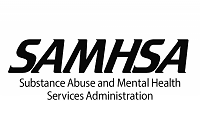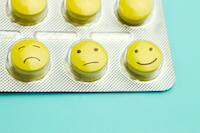
November 13, 2023
In November, SAMHSA released results from the 2022 National Survey on Drug Use and Health (NSDUH), an annual, nationally representative survey on mental health, treatment rates, substance use, and more. Among U.S. adults, 23.1% experienced any mental illness (AMI) in the past year while 6% experienced serious mental illness (SMI). Half (50.6%) of adults with AMI and two thirds (66.7%) of adults with SMI received mental health treatment in the past year. New to the NSDUH, the 2022 report also includes use of non-treatment services: 12.3% of adults received services from a support group and 6.4% engaged with a peer support specialist or recovery coach. To learn more, see the 2022 National Survey on Drug Use and Health Report.
-(002).jpg)
October 29, 2023
Engagement and retention of participants in clinical mental illness research studies can be low. To better understand the perspectives of direct stakeholders, researchers surveyed individuals diagnosed with a schizophrenia spectrum condition (SSC) and caregivers of a family member with a SSC regarding their knowledge, comfort, concerns and preferences related to mental illness clinical research. 67 individuals with a diagnosis and 131 caregivers were include in the final analysis. Overall, individuals with a diagnosis and caregivers were interested in engaging with clinical research. While respondents expressed discomfort with certain research procedures, the authors demonstrate that educational materials tailored to the concerns voiced by these populations may increase meaningful engagement. To learn more, see the study in Psychiatry Research.
.jpg)
October 4, 2023
In an innovative justice diversion project, individuals with serious mental illness were tasked with restoring the landscape of community housing as part of their community-based competency restoration. Participants attended educational workshops, received hands-on training, visited a national forest, and were encouraged to take on leadership roles. After one year, participants had created and taken responsibility for maintaining a successful urban garden. Participants report that gardening has given them a purpose and the ability to create something beautiful, which positively impacts their mental health. Project collaborators also note that the low cost, broad benefits, and easy replicability of the intervention make it a promising new psychiatric treatment modality. To learn more, read the article at Psychiatric Services.
.jpg)
October 3, 2023
In a unique new study, Boston and Harvard University public health researchers recruited 105 TikTok mental health content creators with diverse professional backgrounds and lived experience to receive evidence-based mental health communication training. Creators received either digital toolkits or toolkits plus live virtual training sessions. While review of digital toolkits alone more significantly increased creators’ use of evidence-based themes in their content, both types of training combined led to greater visibility of evidence-based mental health content across TikTok overall. The project highlights the potential of public-academic collaborations to mitigate mental health misinformation with scalable impacts. To learn more, view the preprint here.
.jpg)
September 27, 2023
Research suggests that experiencing substance-induced psychosis increases the risk of developing a schizophrenia spectrum disorder (SSD), but less is known about substance use without psychosis. In a study including 10 million people, Canadian researchers found that individuals with an emergency department visit for substance-induced psychosis were 163 times more likely than the general population to develop a SSD within three years. However, visits for substance use without psychosis occurred more often and were associated with a higher absolute number of transitions to SSD. The findings emphasize the importance of early intervention for substance use concerns – with or without psychosis – to decrease risk of schizophrenia and related conditions. To learn more, see the study in JAMA.

August 23, 2023
A randomized clinical trial of 178 veterans with posttraumatic stress disorder (PTSD) found that written exposure therapy (WET) had similar effects in reducing symptoms as the traditionally used prolonged exposure therapy (PE). Veterans received either five to seven sessions of WET or eight to fifteen sessions of the lengthier PE treatment, and were assessed at baseline, 10, 20, and 30 weeks after the initial treatment session. Improvements in symptom severity from baseline to all later assessments were similar among Veterans receiving WET and PE, with the largest difference favoring WET at 10 weeks. Furthermore, veterans receiving WET were less likely to stop treatment, suggesting it may reduce barriers to engagement associated with other interventions. To learn more, read the article in JAMA.

August 4, 2023
The U.S. Federal Drug Administration (FDA) has approved the first oral medication, Zurzuvae , for the treatment of postpartum depression (PPD). Onset of PPD can occur during the late stages of pregnancy or after childbirth. Previously, PDD medication was only available via IV injection from a health care provider. The effectiveness of Zurzuvae was tested against placebos in two distinct, randomized, double-blind studies for a period of 14 days. In both studies, patients taking Zurzuvae showed a more significant decrease in depressive symptoms at study conclusion, and four weeks after, compared to placebo groups. The approval goes a long way in improving accessibility of PPD treatment for the many individuals the condition affects each year. To learn more, read the news release from the FDA.

August 3, 2023
Patients with bipolar disorder experience cyclic episodes of mania and depression which makes symptom management challenging. Common treatment practices include antidepressants and mood stabilizers or antipsychotics. An international clinical trial study of 177 patients with Bipolar I in remission from a depressive episode were randomly assigned to continue antidepressant use for 52 weeks or taper antidepressant use after six weeks and begin taking a placebo at eight weeks. Patients continuing antidepressant use were significantly less likely to experience a depressive episode (17%) compared to those taking a placebo (40%). However, 12% experienced a manic episode compared to 6% in the placebo group. Further research is needed to better understand the maintenance of manic and depressive episodes in patients with bipolar disorder. To learn more, read the article in the New England Journal of Medicine.
.jpg)
July 13, 2023
In April 2023, the American Psychological Association (APA) surveyed 2,500 American adults about mental health in the workplace. About 1 in 5 workers (19%) rated their workplace as being very or somewhat toxic. These workers were more than twice as likely to have fair or poor mental health (58%) than those who rated their workplace as healthy (21%). And while a majority of respondents are satisfied with the mental health support they receive from their employer, there are significant areas for improvement. Fewer than half of respondents (43%) reported that their employer provides health insurance with coverage for mental health and substance use disorders. To learn more, see the findings from the American Psychological Association.
.jpg)
June 13, 2023
Childhood stress and adverse childhood experiences (ACEs) negatively impact the brain development of children as shown in decreased hippocampal volume. However, positive parenting strategies, such as expressions of warmth and support, may help protect against developmental deficits. Researchers compared brain structures and behavioral health of children aged 10-17, as well as youth- and caregiver-reported positive parenting. Children who reported high levels of childhood stress and positive parenting did not show increased behavioral health concerns or decreased hippocampus volumes, as opposed to children who experienced high levels of childhood stress but not high levels of positive parenting. Notably, caregiver-reported positive parenting did not predict either behavioral concerns or hippocampal volume. The findings suggest that positive parenting can be a protective factor against adverse childhood experiences, and demonstrate the importance of including youth perspectives directly in research. To learn more, read the study in PNAS Nexus.
NAMI HelpLine is available M-F, 10 a.m. – 10 p.m. ET. Call 800-950-6264,
text “helpline” to 62640, or chat online. In a crisis, call or text 988 (24/7).